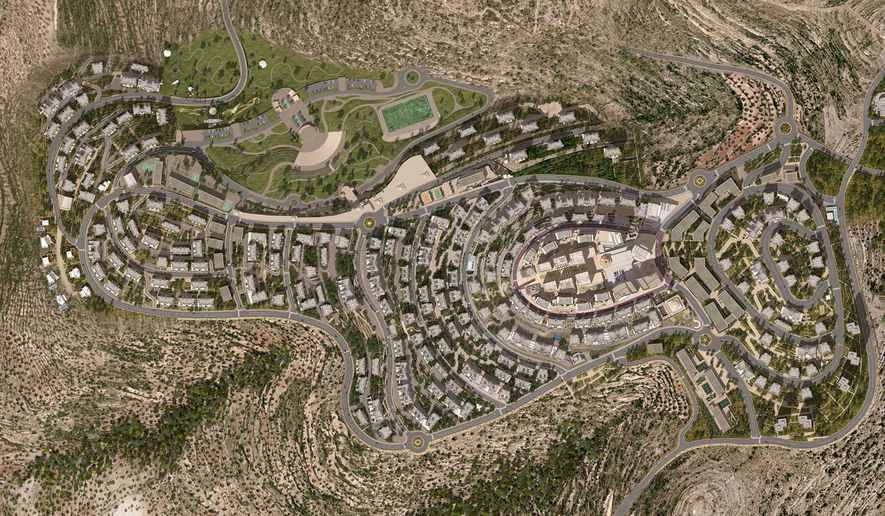OPINION:
RAWABI, WEST BANK — Trust me on this: Reconciliation between Palestinians and Israelis will not be achieved anytime soon, no matter what the professional peace processors say or do. Here in Rawabi, though, modest progress toward that goal is at least possible to imagine.
A $1 billion planned city under construction in the rugged hills of the West Bank 15 miles north of Jerusalem, Rawabi is the “largest private-sector undertaking in Palestinian history.” It is to offer homes, high-tech jobs in a thoroughly modern business district, shopping, entertainment and recreational facilities — including an enormous Roman-style amphitheater — for up to 40,000 upwardly mobile Palestinians.
However, the most important reason to see Rawabi as a hopeful place is this: Its success depends on peaceful coexistence — not to be confused with a peace agreement — between Palestinians and Israelis.
The brains behind Rawabi is Bashar Masri, a visionary Palestinian-American entrepreneur. In Mr. Masri’s eyes, I think it’s fair to infer, being pro-Palestinian does not mean favoring the use of Palestinians as cannon fodder in a jihad to exterminate the Jewish state. Still, the money behind Rawabi is mostly Qatari, and the ruling royal family of Qatar is a major funder of Hamas, which, as recently as this summer, was turning Palestinians in Gaza into cannon fodder in just such a jihad.
Of course, the West Bank is not ruled by Hamas. It is ruled by the Palestinian Authority, which is dominated by Fatah, a political faction headed by Mahmoud Abbas. Hamas and Fatah are rivals, which periodically attempt to be partners.
In 2005, Israelis withdrew from Gaza — every soldier, every settler. Two years later, Hamas launched a civil war there. Its tactics, including throwing Fatah members from rooftops, proved successful. It then began using the territory to fire missiles at Israeli villages. Israelis responded by instituting a military blockade: Food, medicine, building materials — all that and more continued to flow into Gaza, but Israelis attempted, not entirely successfully, to prevent Iranian missiles and other weapons from getting into Hamas’ hands.
On that basis, Palestinians have claimed that Israel continues to “occupy” Gaza. The “occupation” is used to justify more attacks on Israel such as those by Hamas this summer. This is circular reasoning, but the so-called international community claims not to see it.
It is Hamas’ practice to fire missiles from densely populated areas, to store weapons in schools and use hospitals as military headquarters. This clearly contravenes international law. It also guarantees civilian casualties and extensive property damage. The international community responds with outrage — at Israel. The international community does not seem to understand that it is encouraging Hamas to use this tactic again and again. Or maybe it does: Bad public relations for Israelis versus death, poverty and deprivation for Palestinians seems a fair trade-off to many who call themselves pro-Palestinian.
The war this summer left Hamas militarily weakened. However, polls show it continues to enjoy popularity in Gaza and, even more, in the West Bank, where mosques, media and schools have long been telling people to value “resistance” to Israel above all else. If elections were held tomorrow and Mr. Abbas were to run against a senior Hamas leader, such as Ismail Haniyeh, Mr. Abbas would almost certainly lose.
Not that Hamas has any interest in democratic procedures. The Palestinian Legislative Council, which is dominated by Hamas and sits in Gaza, was elected to a single four-year term in 2006. Its members have not bothered to face voters a second time. As for Mr. Abbas, he was elected in 2005, which means he is now going into the 10th year of a four-year term.
A few months ago, Israeli intelligence agents in the West Bank discovered that Hamas was plotting a coup against Mr. Abbas. The Israeli military in the West Bank, the “occupation forces” there, arrested dozens of Hamas members. All this has been acknowledged by Mr. Abbas. Nevertheless, he and other Fatah officials continue to insist that Israel’s “occupation” of the West Bank — and of Gaza — is the only serious impediment to resolving the Palestinian-Israeli conflict. The international community goes along.
Were Hamas to take over the West Bank, it would be only a matter of time before its fighters clashed with Israelis. Because Rawabi is a city on a hill, it would be a good spot from which to fire missiles at Israel’s major population centers and its international airport. Assuming Israelis returned fire, a billion dollars and years of hard work would within days be reduced to rubble.
Hamas would call that a victory. Just after this summer’s war, Mr. Haniyeh posed for an iconic photo in front of his Gaza home — or rather the debris that had been his home. He holds up two fingers in a V sign — for victory, one assumes; certainly not for peace.
For these and other reasons, Rawabi is a risky venture. For the same reasons, though, it deserves support — not least from Israelis. According to Mr. Masri, such support has not been forthcoming. For example, Israeli authorities have delayed approval for a main water-supply connection. That has pushed back the “move-in” date for the first residents which, in turn, has caused serious cash-flow problems.
As for the Palestinian Authority, the recipient of a river of foreign aid, five years ago it agreed to provide $150 million for the building of Rawabi’s schools, a police station and other public amenities. To date, Mr. Masri said, not a dime has arrived.
As noted, the Palestinian-Israel conflict is not about to end any time soon. Surely, those who would like to see it resolved eventually ought to be backing Rawabi to the hilt.
Clifford D. May is president of the Foundation for Defense of Democracies and a columnist for The Washington Times.




Please read our comment policy before commenting.